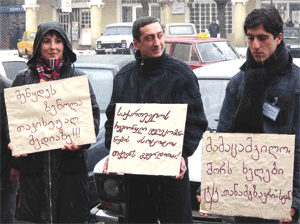 Various highly respected international organizations have blamed the Georgian Government for suppressing the independent media sources. UN Human Rights Committee, International Committee to Protect Journalists, “Journalists without Borders” are all deeply concerned because the Georigan government has not investigated not one instance of harassment of journalists or instance of violence being used against the media. These organizations are calling upon the Georgian authority to protect their hard earned freedom of expression, as well as to be allow to maintain the independence of printed and other media sources.
Various highly respected international organizations have blamed the Georgian Government for suppressing the independent media sources. UN Human Rights Committee, International Committee to Protect Journalists, “Journalists without Borders” are all deeply concerned because the Georigan government has not investigated not one instance of harassment of journalists or instance of violence being used against the media. These organizations are calling upon the Georgian authority to protect their hard earned freedom of expression, as well as to be allow to maintain the independence of printed and other media sources.
“Harassment of Media in 2007” is the title of the report that was prepared by the International Committee to Protect Journalists. The report reveals the situation in Georgian media last year. The committee is particularly critical regarding the events that took place on the November 7, 2007 (a large-scaled protests in Tbilisi that was violently dispersed by riot police; many journalists were beaten and two TV Stations, “Imedi’ and Kavkasia were shut down by the government).
“An out-of-control Saakashvili closed down TV Companies “Imedi” and “Kavkasia” in revenge for their in real time reporting. However, those that toed the official government line were allowed to stay on the air while other TV stations that supported the government were allowed to continue their broadcasting. According to the local media sources, journalists were not even allowed to receive public information from governmental bodies. Even now public officials are still ignoring us and refuse to cooperate with the press. Despite the difficulties, journalists have managed to expose various facts of abuse of power by high ranking officials; in doing so journalists have been able to support people in creating a general idea about what is going on with those in positions of authority,” stated the report.
UN Human Rights Committee does not hide its grave concern about uninvestigated cases of how journalists’ are being harassed in Georgia. “Georgia should guarantee the freedom of expression, printed and other media sources. Authorities should investigate filed complaints on harassment on time; criminals should be found and punished,” stated the report of the Committee.
Ia Mamaladze, the chairperson of the Georgian Regional Media Association, stated that the assessments of the international organizations as being adequate.
“The government fights media sources with old methods; however they have introduced new terms, like “self censure,” “standards”, “regulations,” “manipulations on owners” etc. Such methods are highly effective in controlling media outlets. It is difficult under such conditions to comply with journalist ethical norms as well as universal norms of human rights. However, media sources that support the Georgian government feel safe. The situation is more obvious in regions where there is no mechanism to guarantee the safety of journalist and the quality of independence of the media sources,” said Mamaladze.
Mamaladze added that recently local public officials have been promoted after they insult, harass or take out their anger on journalists. “Georgian president, Mikheil Saakashvili set an obvious example to local public officials when Akaki Bobokhidze, Imereti Regional Governor, was promoted after he had harassed a journalist in Kutaisi. He was appointed to an even higher position in the Georgian Ministry of Defense as a reward. It is noteworthy, that it is mostly law enforcement agencies that are abusing journalists. Consequently, it is obvious that law enforcers shall not start criminal investigations against themselves,” said the chairperson of the regional media association.
The Georgian Public Defender’s Office considers the report of the UN Human Rights Committee as being on the mark. “The Committee published the report as a result of the evaluation of the so-called Northern Report prepared by Georgian NGOs. Rafael Rivaz Posada, chairperson of the Committee, remarked while discussing the third periodic report of Georgia. Sozar Subari, the Georgian Public Defender, was present while the report was being discussed and later he had a one-hour confidential conversation with other members of the committee.
Experts stated that based on the 2006 information of the international organization “Reporters without Border” Georgia occupied 89th place among 168 countries in the sphere of freedom of expression. The information of the Human Rights Center is also mentioned about the facts of journalists’ being harassed. Unfortunately, law enforcers have not investigated any case of suppression on journalists, preventing journalists form professional activities. Consequently, the assessment of the UN Human Rights Committee is completely adequate of the real situation,” said Giorgi Gotsiridze, representative of the Department for Equality and Freedom within the Georigan Public Defender’s office.
The chairperson of the non-governmental organization “Former Political Prisoners for Human Rights” considers that journalists are mostly abused in Georgian regions. “Particularly difficult is the situation those regions where media sources are suppressed, freedom of expression is restricted and journalists are at risk. Public officials use illegal and immoral activities to threaten and discredit regional journalists. The government, which shut down TV Company “Imedi” has not, investigated a single instance of where rights have been violated; the government has suppressed many media sources in the capital and it is not facing off with the independence of regional media sources and many journalists. Consequently, when public officials cannot manage to bribe journalists, they then start to force them to stop activities in other ways. Many similar facts are not made public yet,” said Nana Kakabadze.
Gela Mtivlishvili, Kakheti



